205 Ergebnisse
In this podcast, Professor Darrick Hamilton critically discusses how current neoliberal economic models uphold a systemically racially unjust structure of economies.
This video explains what the term 'Feminist Economics' describes and goes into detail on how feminist economists use methodology differently, why they advocate for diversity in research and how to look into preconditions for the functioning of our economies. It, additionally, highlights the link between feminist economics and the study of climate change.
In this one-on-one interview, co-host Gerardo Serra talks with Felwine Sarr, author of Afrotopia (2016) and professor of economics at Gaston Berger University in Senegal. Topics include the relevance (or lack thereof) of development economics to conditions in African economies, the significance of African philosophy for thinking about the economic problems of the continent, and the status of the field of history of economic thought in Africa.
This course introduces students to political economy and the history of economic thought. We will cover the core ideas in various schools of economic thought, positioning them in the historical and institutional context in which they were developed. In particular, we will cover some economic ideas from the ancient world and the middle ages; the enlightenment; the emergence of and main ideas in classical political economy (Adam Smith, David Ricardo, Thomas Malthus, and others); Marx, Mill, and Keynes; European versus American economic thought through history; the rise of mathematical economics; economic theories around state-managed economies versus socialism; Austrian economics; behavioral economics; and the future of economics.
This book introduces 40 critical pointers for those who wish to see the theory in a broader, more realistic context. The material is suitable for introductory and intermediate courses and can be included selectively by students for additional reading or in lectures or tutorials as discussion points. "Students of mainstream economics need a guide like this to help them understand the underlying assumptions, limitations and inbuilt biases of what they are studying. It helps them open their eyes to a broader view of how real economies work."
With the collapse of the planned economies of Eastern Europe, the market is extending its reach and at the same time claiming its universal applicability. But this is occurring while paradoxically it is becoming more difficult to define "the market". The authors, all outstanding scholars in the booming field of socio-economics, explore how concrete markets are built up and stabilized.
This book challenges the mainstream paradigm, based on the inter-temporal optimisation of welfare by individual agents. It introduces a methodology for studying how institutions create flows of income, expenditure and production together with stocks of assets and liabilities, thereby determining how whole economies evolve through time.
This book makes the case that economies are complex systems and in response to this, develops a unique dynamic nonequilibrium process analysis of macroeconomics.
Uncertain Futures considers how economic actors visualize the future and decide how to act in conditions of radical uncertainty. It starts from the premise that dynamic capitalist economies are characterized by relentless innovation and novelty and hence exhibit an indeterminacy that cannot be reduced to measurable risk.
In economics the dominant framework for exploring the structure of market economies is provided by the neoclassical school of thought. This text aims to show how neoclassical theory is used to model market mechanisms, both in particular markets and in the market economy as a whole.
This book analyzes the transition of chocolate from an exotic curiosity to an Atlantic commodity. It shows how local, inter-regional, and Atlantic markets interacted with one another and with imperial political economies. It explains how these interactions, intertwined with the resilience of local artisanal production, promoted the partial democratization of chocolate consumption as well as economic growth.
Although money plays a key role in our lives, the workings of our monetary system are a mystery to most of us. ‘The Waterworks of Money’ by cartographer Carlijn Kingma is an attempt to demystify the world of big finance. It visualizes the flow of money through our society, its hidden power made manifest.
If you see money as water, our monetary system is the irrigation system that waters the economy. The better the flow, the more prosperous society will be. Just as water makes crops thrive, so money sets the economy in motion. Or at least that’s the idea. In reality, inequality is growing in many countries and people are dealing with a ‘cost of living crisis’. Meanwhile, the progress with making our economies sustainable is stalling, and financial instability remains an ongoing threat. These problems cannot be seen in isolation from the architecture of our money system. If we truly want to tackle them, we will have to address the design flaws of our current money system.
For more info check: https://www.waterworksofmoney.com or https://www.carlijnkingma.com
For the Dutch version of the animation check: https://www.ftm.nl/waterwerk
Current exhibitions: 'The Future of Money' at Kunstmuseum Den Haag, 14 April, 2023 - 8 September 2023. 'Plumbing The System' at the Dutch Pavilion of the Venice Biennale, 20 May 2023 - 26 November 2023
The second animation video of this series will be released in September 2023.
The Waterworks of Money is a collaboration of cartographer Carlijn Kingma, investigative financial journalist Thomas Bollen, and professor New Finance Martijn van der Linden. Kingma spent 2300 drawing hours, based on in-depth research and interviews with more than 100 experts –ranging from central bank governors and board members of pension funds and banks to politicians and monetary activists.
The structure of our monetary system is not a natural phenomenon. We can choose to change its architecture. Designing the money system– and the laws and institutions that govern it–is ultimately a democratic task, and not a commercial or technocratic one. In practice, however, there is a major obstacle impeding the democratic process: financial illiteracy. By making finance and money needlessly complex, economists, bankers and tax specialists have turned most of us into ‘financial illiterates’. Everyone who doesn’t speak their financial jargon is excluded from the democratic debate on how our monetary system should work.
The Waterworks of Money bypasses the financial jargon. It is an attempt to boost systemic financial literacy. Only if ordinary citizens develop their own vocabulary to participate in the debate about their financial future, can they tell their politicians which kind of ‘financial irrigation system’ they want.
Authors: Carlijn Kingma, Thomas Bollen, Martijn Jeroen van der Linden
Animation: Tiepes, Christian Schinkel, Cathleen van den Akker
Narrator: Loveday Smith
Translation: Erica Moore
Voice recording: Huub Krom
Music and sound: Rob Peters
Photography: Studio OPPA
Partners: Follow the Money, De Haagse Hogeschool, Stimuleringsfonds Creatieve Industrie, Brave New Works, Rabobank, Kunstmuseum Den Haag, Rijksmuseum Twenthe
The objective of the course is to explore the main strengths and weaknesses of orthodox and heterodox paradigms within development economics.
Complexity economics and institutional economics are complementary approaches to studying the economy. They can pool their methods and foundational theories to explain the mechanisms that underlie economies.
Institutional economics focuses on the role of social institutions in terms of laws or contracts, but also those of social norms and patterns of human behaviour that are connected to the social organisation of production, distribution and consumption in the economy.
Stratification economics is defined as a systemic and empirically grounded approach to addressing intergroup inequality. Stratification economics integrates economics, sociology and social psychology to distinctively analyze inequality across groups that are socially differentiated, be it by race, ethnicity, gender, caste, sexuality, religion or any other social differentiation.
This is an overview of (possibly transformative) proposals to address the economic consequences of the corona crisis
Approaching the law of nature that determines all forms of economy. The bulk of economic theory addresses the economic process by setting out on a catalogue of aspects, seeking the laws in the aspects and hoping to get together a reliable view of the whole.
Dependency in Central and Eastern Europe - Self-reliance and the need to move beyond economic growth
In this essay, the author takes a critical perspective on the pursuit of growth as the solution for providing for environmental sustainability and economic stability in the countries of Central and Eastern Europe.
Drawing from the framework of dependency theory and presenting brief insights into European core-periphery relations the author then argues for the implementation of an alternative strategy to development that is built around the concept of self-reliance.
In this overview paper, Laura Porak reviews the history of industrial policy in the European Union before the background of a Cultural Political Economy approach.
MERCOSUR (Mercado Común del Sur or Common Southern Market) was the first formalized attempt to integrate South American countries economically and politically.
This essay focuses on the sources of government revenue within the Middle East and North African (MENA) region and proposes the implementation of a regional tax reset through increased taxation and tax reforms, deregulation in the private sector and economic diversification to reduce macroeconomic volatilities caused by the hydrocarbon industry.
Three dominant forces worldwide are driving change today in our financial markets: competition, technology and regulation. But their collective impact in reshaping the markets, though they may be viewed individually as desirable or well-intentioned, is producing challenging results that are difficult to predict, hard to control and not easy to understand.
Exploring Economics Dossier on the economic fallout of the COVID-19 pandemic and the structural crisis of globalization. COVID-19 encounters a structural crisis of globalization and the economic system that drives it, with an uncertain outcome. We asked economists worldwide to share with us their analysis of current events, long-term perspectives and political responses. The dossier will be continuously expanded.
A review of:
[1] Intermediate Microeconomics, H.R. Varian
[2] Mikrooekonomie, R.S. Pindyck, D.L. Rubinfeld
[3] Grundzuege der mikrooekonomischen Theorie, J. Schumann, U. Meyer, W. Stroebele
Introduction Economics is by necessity a multi paradigmatic science Several theoretical structures exist side by side and each theory can never be more than a partial theory Rothschild 1999 Likening scientific work to the self coordinating invisible hand of the market Michael Polanyi cautioned strongly against centralized attempts to steer …
Marxian Political Economy focuses on the exploitation of labour by capital. The economy is not conceived as consisting of neutral transactions for exchange and cooperation, but instead as having developed historically out of asymmetric distributions of power, ideology and social conflicts.
An essay of the writing workshop on Nigeria’s Readiness for and the Effect of the Fourth Industrial Revolution
The outbreak of COVID-19 has substantially accelerated the digitalization of the economy. Yet, this unprecedented growth of digital technology brought novel challenges to the labour market. Rise in income inequalities and precarious working conditions or polarization of jobs. In this essay, we try to assess what tools to use to counter these trends.
What influence do changes in tax policy or state decisions on expenditure have on economic growth? For decades, this question has been controversially debated.
This course provides future change makers in public and private sectors with a comprehensive overview on the structures and actors that shape markets.
Die Disziplin der Wirtschaftswissenschaften nutzt im Bereich der Verhaltensökonomik häufig experimentelle Spiele, um das menschliche Verhalten zu untersuchen, wie z.B. das Diktatorspiel. Mithilfe postkolonialer Analysemethoden untersucht dieser Essay am Beispiel eines bekannten Aufsatzes der Verhaltensökonomik von Henrich et al. 2001 zu indigenen Gemeinschaften, wie Wissen über menschliches Verhalten in wirtschaftlichen Kontexten konstruiert und kategorisiert wird.
Wir nutzen Cookies. Klicke auf "Akzeptieren" um uns dabei zu helfen, Exploring Economics immer besser zu machen!






























